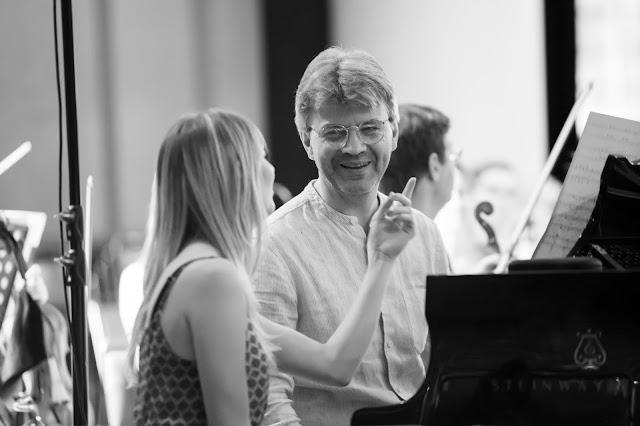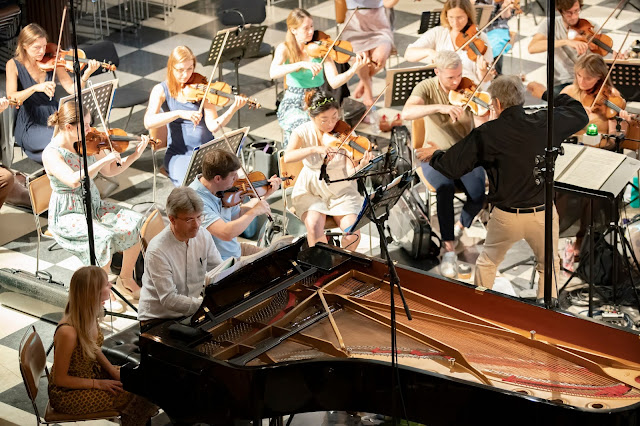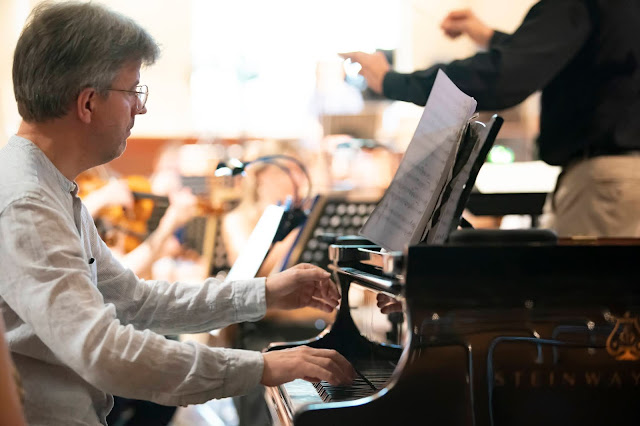 |
| Mark Bebbington at 2019 recording session for Resonus Classics' first Poulenc disc (Photo Nick Rutter) |
One of the most imaginative concerts that I came across last Autumn, with ensembles allowed to perform yet restricted as to numbers, was one at St John's Smith Square where Jan Latham Koenig conducted members of the Royal Philharmonic Orchestra (RPO) with pianist Mark Bebbington and baritone Roderick Williams in Poulenc's Aubade and Le Bal masqué, two works which are woefully under-represented both on the concert platform and on disc [see my review]. Mark Bebbington, Jan Latham Koenig and the RPO have already given us a fascinating disc of Poulenc's music on Resonus Classics which combined the piano version of the Concert champêtre with the Piano Concerto and chamber music [see my review], and now a second Poulenc disc has just been issued by the same team. The new disc combines Poulenc's Aubade and Le Bal masqué with the Sextet and the late Flute Sonata. These two Poulenc discs are the first fruits of a planned French music series from Mark Bebbington and Resonus Classics. I spoke to Mark via Zoom to chat more about the music of Poulenc and other plans.
 |
| Mark Bebbington |
Mark sees the repertoire for the first two Poulenc discs with the combination of piano concertante works and chamber music as being a good starting point, and with the new disc, neither ensemble work is strictly orchestral. He laughingly describes Aubade as the perfect lockdown piano concerto, requiring as it does just 16 instrumentalists which plus soloist and conductor made perfect numbers for a socially distanced concert at St John's Smith Square. Having come up with Aubade, adding Le Bal masqué and the Sextet made a good programme, but more importantly one that it was possible to record in a socially distanced manner. This meant that Autumn 2020 for Mark is indelibly associated with these works when the rest of the musical world was not able to do much.
One of the reasons why Aubade is not well known is that its combination of instruments (a mix of strings and wind but no violins) makes the work difficult for promoters to programme. It was commissioned in 1929, as a ballet score to be performed out of doors in Paris with the dance choreographed by Bronislava Nijinska (1891-1972). This unusual instrumental layout leads to something of a vicious circle, promoters and orchestras are unwilling to take a box office risk on an unknown work, so the work remains unknown to the public, and so on. Mark also points out that Poulenc's concertante piano works often do not end with the sort of pianistic razzle-dazzle that can be popular in big concertos. On his previous disc, Mark played the Piano Concerto which dates from 1949 but which wasn't the virtuoso showcase at its Boston, USA premiere that was expected. And for all their exuberance works like Aubade are almost private works. The immediacy of Aubade is not always felt in the concert hall, it lacks any musical display for its own sake and the ending is positively downbeat as the final movement is almost mystical. Mark feels that Aubade is a work that really needs getting to know.
By contrast, the Sextet (written in the 1930s for piano and wind quintet) is well known, Mark points out that when he was at college he was regularly asked to perform it and for the recording, all the RPO players bar one had performed the work before. The work is full of natural exuberance and the high jollity in the last movement seems to make an automatic connection with the audience.
Le Bal masqué, a secular cantata from 1932 which sets Surrealist poems by Max Jacob (1876-1944), is a brilliant work. Mark calls it a masterful mix of the poetic and the banal. So that whilst the last movement is full of consciously appealing music, almost like a Gallic version of Knees up Mother Brown, the penultimate movement is more in the world of Schoenberg and Webern. This difficulty of pinpointing him to a particular style is part of Poulenc's genius but it does also make a difficulty for audiences.
The feeling of intimacy applies to much of Poulenc's solo piano music as well. He wrote only one big concert solo work, and much of the rest are miniatures that need to be performed in a space like the Wigmore Hall rather than somewhere bigger. This makes them overlooked, but Mark sees Poulenc's piano music as warranting the same degree of care as a pianist might give to the piano music of Debussy or Ravel.
 |
| Francis Poulenc & Wanda Landowska (Photo Bibliothèque nationale de France) |
There is also a live recording of the Concert champêtre from 1948 with Poulenc playing the solo piano part with Dmitri Mitropoulos conducting the New York Philharmonic (available on YouTube), and what struck Mark on listening to this recording was the liberties that Poulenc took with the score! For the opening statement, Poulenc the soloist does a huge diminuendo (something not written in the score but then it would not be possible on the harpsichord). Mark liked the effect and followed the composer-as-performer in doing it, but was taken to task by a critic!
Mark comments that Poulenc, the composer, writes very carefully in his scores, marking things up in great details, but as a performer, he often ignores the markings. In the Flute Sonata (which dates from 1956-57) there is a passage marked bathed in pedal, but Poulenc barely uses the pedal at this point in his recorded performance of the work. Mark finds it extraordinary the number of time Poulenc the performer ignores his own markings. Evidently, Poulenc was very improvisatory as a performer, and he felt that yielding to the moment was what brought the music alive and he would take his own markings with a pinch of salt. As a performer, Mark tries to consider the composer's own flouting of the rules and tries to recreate Poulenc's spontaneity as a performer.
Mark has spent a lot of time studying Poulenc's own performances. For instance, they have taken some of their tempos for Le Bal masqué from the recording of it with Poulenc playing the piano and conducted by Louis Fremaux (1921-2017). This has made for a far more interesting journey than Mark could have ever predicted when he started planning repertoire for the Poulenc discs, and Poulenc's music has been a complete revelation.
Mark has something of a reputation for performing and recording lesser-known works, and even today he finds a great joy in recording these works, shining a light on composers who are unjustly neglected, rather than recording another cycle of Schubert or Chopin, no matter how fantastic these composers are. He finds it enormously invigorating to find first-rate works which are not represented on disc or on the concert platform, and the medium of recording is still the best way to rectify these imbalances. There is lots of first-class material out there, but when putting together programmes pianists tend to stick to the tried and tested.
He has recorded around 30 discs of English music for SOMM, including complete cycles of piano music by John Ireland and by Frank Bridge. Whilst Ireland's music is not unknown, major cycles of his piano pieces are still rare in recital and Mark wanted to highlight this neglect.
 |
| Mark Bebbington, Jan Latham Koenig and Royal Philharmonic Orchestra at 2019 recording session for Resonus Classics' first Poulenc disc (Photo Nick Rutter) |
When programming his own recitals, Mark likes to perform well-known music in a context that allows for less well-known pieces as well. He has three recitals scheduled at St John's Smith Square for later this year. Notes from a Small Island on 4 June 2021 will focus on Robert Simpson (1921-1997) along with other 20th-century English composers. Simpson, who is best known for his symphonies and string quartets, was a fantastic writer for piano and Mark will be playing Simpson's Variations and Finale on a theme of Haydn, one of his three major works for piano. Then later this year Mark will be marking the Malcolm Arnold centenary by playing his one significant piano work, the Variations on a Ukrainian Folksong, and pairing this with the Gershwin songbook. For the final concert of the three, Mark will be pairing Tenebrae by John McCabe (1939-2015), a work which Mark calls a masterpiece, with Liszt's Sonata in B minor; both works, he feels, inhabit the same landscape.
Looking ahead, there are plans to record the Piano Concerto No. 1 by Alan Rawsthorne (1905-1971) in its first version for piano and strings (and so good for a socially distanced recording). This is one of those works that have mysteriously disappeared from the repertoire. All the major pianist played it in the 1960s, but the last major performance that Mark can find is when Dame Moura Lympany (1919-2005) performed the version with full orchestra in 1992. Yet for her first concert in Paris after the Second World War, it was the Rawsthorne concerto that Lympany chose.
Mark wonders whether 50 or 60 years ago British music travelled better. After all the Piano Concerto by John Ireland (1879-1962) was the best known British work, and the great pianist Artur Rubenstein (1887-1982) made his BBC Proms debut with the work. This, Mark feels, gives historical justification for seeking out works and finding possible merit in them.
Mark studied with the Italian pianist Aldo Ciccolini (1925-2015) who was a great exponent of French music including lesser-known pieces. Ciccolini remains a big influence on Mark, who describes him as such a great person and a wonderful human being. Mark studied in Italy with Ciccolini after studying at the Royal College of Music, and Mark found his time with Ciccolini to be completely liberating. Ciccolini wasn't pedagogical or didactic, and the young Mark found it a revelation.
When I asked Mark what he would choose to record if there were no financial or other constraints he immediately mentioned the mammoth Piano Concerto by Ferruccio Busoni (1866-1924), and then adds the Turangalila Symphony by Olivier Messiaen (1908-1992), which includes a concertante piano part. Mark adds that Jan Latham Koenig used to play the piano part to the symphony, and Mark really does hope to get to Turangalila eventually. A further work on his list would be the Symphonic Variations by Cesar Franck, another of those works which were once common but seem to have disappeared, partly perhaps because of its awkward (short) length, around 15 to17 minutes. Mark's teachers used to perform it, and Aldo Ciccolini would programme it with the orchestral version of the Faure BalladeThere are other works of interest. He mentions the Piano Concerto by the conductor Wilhelm Furtwangler (1886-1954). This is evidently gargantuan, in the style of Schoenberg's Gurrelieder, but so far Mark has not been able to locate the music for it though there are rumours that Daniel Barenboim performed it when he was young.
But having said that, Mark would also love to do a Schubert cycle but it is, he admits, a matter of sorting out his priorities. Also, there is the question of what will sell, so he needs to be practical and pragmatic. Mark teaches at the Royal Birmingham Conservatoire and he thinks that young players get on the recording bandwagon far earlier than used to be the case. He always advises his students that, when making recordings to avoid the well-travelled road. After all, it is difficult to make an impact if yours is the 150th recording of a work.
The restrictions of lockdown and social distancing have meant that orchestras and promoters have had to look at other repertoire and be more imaginative in their programming. Evidently, chamber works by William Alwyn (1905-1985) have done well in the present climate. When Mark and the RPO presented their Poulenc concert at St John's Smith Square it sold out (admittedly to a reduced audience) and their other concert did well as well, and this paired the Piano Concerto by Doreen Carwithen (1922-2003) with the Eclogue by Gerald Finzi (1901-1956). This is encouraging, that there is an audience for this type of music. And Mark hopes that other promoters are thinking and being creative and that this will continue when restrictions are eased.
 |
| Mark Bebbington at 2019 recording session for Resonus Classics' first Poulenc disc (Photo Nick Rutter) |
Mark wants people to think about how we make music and who we make it for. One idea from last Autumn which had to be abandoned because of a return to lockdown was the plan to perform the Poulenc Sextet in shopping centres and stations. Mark feels that it would have been such a wonderful idea to perform the Sextet somewhere like Debenhams in Oxford Street.
- Francis Poulenc: Aubade, Le Bal masqué, Flute sonata, Sextet - Mark Bebbington (piano), Roderick Williams (baritone), Emer McDonough (flute), Royal Philharmonic Orchestra, Jan Latham Koenig - Resonus Classics
- Francis Poulenc: Piano Concerto, Concert champêtre, Trio for Piano, Oboe & Bassoon, Sonata for Oboe & Piano - Mark Bebbington (piano), Royal Philharmonic Orchestra, Jan Latham Koenig- Resonus Classics
The blog is free, but I'd be delighted if you were to show your appreciation by buying me a coffee.
- Bach's Goldberg Variations in a winning new arrangement for violin, guitar and cello - record review
- Science Fiction, AI, music and collaborative creation: the Lim Fantasy of Companionship for piano and orchestra - record review
- Wild Blue Yonder: new disc of chamber music by Eleanor Alberga - record review
- Spring song continues: Leeds Lieder with Fleur Barron, Gerald Finley, Benson Wilson, Sarah Connolly and many more - concert review
- A new film inspired by George Orwell's 1984 has Mihkel Kerem's powerful new orchestral score at its heart - film review
- The balance between a perfect art form & giving people what they want: conductor George Jackson chats about Mozart's Le nozze di Figaro with which he opens Opera Holland Park's 2021 season - interview
- Thoughtful and imaginative: The Children's Hour sees baritone Gareth Brymor John and pianist William Vann taking a very adult view of childhood - record review
- Rediscovered: British
Clarinet Concertos by Susan Spain-Dunk, Elizabeth Maconchy, Rudolph
Dolmetsch, Peter Wishart from Peter Cigleris, BBC National Orchestra of
Wales, Ben Palmer - record review
- A disc to enjoy: William Towers and Armonico Consort in Handelian Pyrotechnics - record review
- Flight at the museum: Seattle Opera's new film imaginatively re-locates Jonathan Dove's opera - opera review
- Fantasie Nègre: The Piano Music of Florence Price - record review
- New
Beginnings indeed: the Royal Northern Sinfonia and its principal
conductor designate, Dinis Sousa, launch Sage Gateshead's new live
season - concert review
- Home












No comments:
Post a Comment